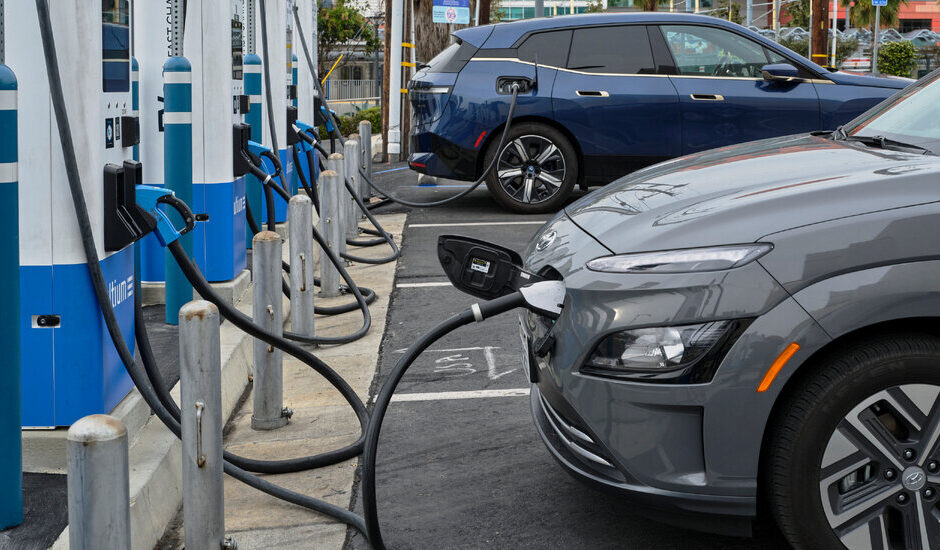President Trump’s tariffs on imported cars and auto parts could stall the growth of electric vehicles, setting back a technology critical to addressing climate change.
But the tariffs could also work in favor of some electric models made in the United States, like the Tesla Model Y or Volkswagen ID.4, that are among the cars with the fewest imported parts and, thus, the least vulnerable to tariffs.
The tariffs could lead to steep increases in the cost of batteries and other components. By hurting electric vehicle manufacturing in the United States, the tariffs could also cede more ground to Chinese automakers that have a substantial lead.
One thing is clear: The tariffs will raise prices for all vehicles — gasoline, electric or hybrid — and could lead to severe parts shortages if some suppliers go out of business. There will be ripple effects that no one can predict. But vehicles that are subjected to lower tariffs could gain a competitive advantage.
E.V. supply chains may be easier to overhaul
Electric vehicles have far fewer parts than cars that run on gasoline or diesel. In theory, it should be easier for carmakers to source parts from the United States, avoiding tariffs.
Efforts to create a domestic supply chain for electric vehicles are well underway, in part because of Biden administration policies that provided loans and subsidies to battery factories and other projects.
LG Energy Solution, a South Korean battery maker, runs three battery factories in the United States that supply General Motors and other customers. Three more LG plants will begin producing batteries next year, and a seventh is planned.
“The capacity is there, and now we’re just managing the ramp-up to meet the market size,” Robert Lee, the president for North America at LG Energy Solution, said in a recent interview.
The problem is that many battery raw materials come from China and may face stiff tariffs. For example, China dominates the supply of refined graphite, an essential ingredient in most electric vehicle batteries.
American companies are working on producing battery-grade graphite, lithium and other key materials. But it will be several years before these operations can replace Chinese suppliers.
Some E.V.s are already the most American-made
All the cars that Tesla sells in the United States are made in California or Texas. Last year, Tesla’s Model Y sport utility vehicle topped Cars.com’s annual American-made index, which uses data that automakers submit to the federal government and other sources to rank vehicles according to how much of their content and labor originates in the United States.
Tesla uses some parts from Mexico and China that will be subject to tariffs, but less so than other automakers. That gives the Model Y, Tesla’s most popular vehicle, a cost advantage that could narrow the price gap with conventional cars. On average, sale prices for electric vehicles are $12,000 more than comparable vehicles with internal combustion engines, according to Cox Automotive.
“We do have localized supply chains in both America, Europe and China,” Elon Musk, the chief executive of Tesla, said last week on a conference call with analysts and investors. “So that puts us in a stronger position than our competitors.”
Another vehicle relatively insulated from tariffs is the Volkswagen ID.4, an electric sport utility vehicle made in Tennessee with a battery from Georgia.
“That’s not a bad thought,” Kjell Gruner, the president of Volkswagen Group of America, said last week when a reporter asked whether the ID.4 might gain a competitive advantage.
But he added that figuring out the ultimate impact of tariffs was extremely difficult because many variables were at play and because Mr. Trump’s trade policies changed frequently. Mr. Gruner said he started each day with a meeting with other executives to discuss the latest developments.
“You need to look at your entire value chain, from logistics to manufacturing, procurement, sales and marketing,” Mr. Gruner said. “You need to get into the weeds.”
Mr. Musk has warned that tariffs will also be bad for Tesla and said he had failed to talk the president out of them.
Automakers may favor more profitable gasoline vehicles
Except for Tesla, most carmakers don’t make much or any money on electric vehicles. Carmakers may decide to curtail production of those cars and focus on gasoline pickups and sport utility vehicles that usually are very profitable.
The risk is that, by delaying rollouts of electric vehicles, U.S. carmakers will lose their ability to compete with Chinese, South Korean and European carmakers that are expanding their electric lineups. There is near unanimity in the industry that sooner or later electric vehicles will become more popular than cars with internal combustion engines.
“It’s hard to figure out how you net out the massive costs potentially associated with tariffs with the need to continue to invest in the future,” said John Bozzella, president of the Alliance for Automotive Innovation, an industry association.
Some tariffs will fall harder on E.V.s
Electric vehicles usually have more semiconductors than cars with internal combustion engines and would be hit harder by tariffs on chips that Mr. Trump has signaled may be coming.
Some tariffs may also apply to charging equipment, which could slow the recent rapid growth of stations where people can plug in vehicles. Fear of not being able to find a charger has kept many people from buying electric vehicles.
The motors in most electric vehicles use magnets that contain rare earth minerals, which will be in short supply because of restrictions that China recently imposed in retaliation to U.S. tariffs.
The rare earths crunch will probably come in the second half of the year, said Neha Mukherjee, lead rare earths analyst at Benchmark Mineral Intelligence.
“There are stockpiles already in the market which can suffice for now,” Ms. Mukherjee said. If the restrictions continue, she said, “we’ll see prices ticking higher.”
#Tesla #Volkswagen #Leg #Tariffs #Raise #Prices


